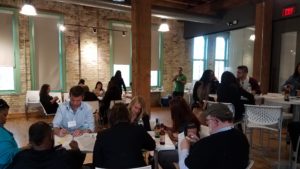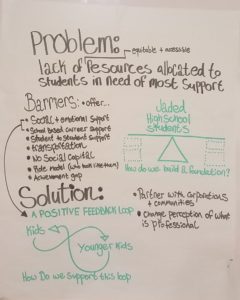Goals for 2018-19 School Year
Our workgroup met Tuesday evening to walk through our goals for the 2018-19 school year which are focused on getting Number Talks to take root within schools.
- Validate assumptions about what needs to be in place for Number Talks to take root and spread within a school
- Pilot effort with Brown Street Academy and Prince of Peace
- Recruit and prepare additional educators in round 2 schools
- Develop community of practitioners that can support pilot and round 2 schools
Assumptions
Our assumptions about what needs to be in place for Number Talks to take root and spread within a school come out of our workshop at the Systems Thinking Institute in March, and our ongoing work with educators involved with the project.
Support
- Overt support of building leadership
- Community Partners (Learn Deep, Milwaukee Succeeds, UWM)
Resources
- In-building expertise/support for Number Talks in a role that can serve classroom teachers
- Willing cohort of teachers
- Time for in-building collaboration
- Cross-school network of practitioners willing to share problems and ideas
- Peer-based professional development
Tools
- A shared set of tools teachers can use in their practice:
- Common Terms
- Sentence Starters
- Anchor Charts
- etc.
Collaborative Feedback Processes
- In-building
- Cross-school/district
Pilot School Criteria
Our assumptions about what is required for Number Talks to take root and spread, guide our criteria for where it makes sense to pilot the effort:
- Supportive Building Leadership
- In-school resource in a role that can support colleagues working to establish Number Talks as a regular practice.
- 3+ teachers willing to establish Number Talks as a regular practice within their classrooms from the start of the school year.
- Participants willing to collaborate across school/district boundaries
We’re excited to be able to pilot the effort with Brown Street Academy (MPS) and Prince of Peace Elementary School (Seton Schools), and will be working with both schools over the summer to prepare for a fall start.
Tools
A number of the tools teachers planning to implement Number Talks are looking for were produced and archived as part of the GE Foundation project within MPS. These include:
- Sentence Stems
- Discussion Prompts
- Math Strategies
- Planning Guide
- Teacher Moves
These tools, and others are available on the project’s legacy site:
https://sites.google.com/milwaukee.k12.wi.us/gefvideos/math-resources
In our work this year, we also saw the need for a couple of additional tools– first, what we’ve been calling a Strategy Map– a quick guide for teachers that, for a given Number Talk, gives them a sense of the types of strategies they might see, common errors, and for those common errors, strategies a teacher can use to allow students to recognize and correct the error. We’ll explore what these might look like over the summer.
We’ve also heard a need for a tool that can allow a teacher easily note where a student is in their thinking or level of comfort with a strategy that does not disrupt the flow of the discussion. A simple checklist may suffice and we’ll look to test out some options within our pilot schools.
Collaborative Feedback Process
In-Building
For teachers to quickly develop competence and comfort in a new practice, effective, timely feedback is key. We envision a process that borrows from Scrum, an agile methodology used in software development. The idea here is a quick daily meeting that allows team members working on a common project (in this case Number Talks) to communicate where they are, where they are headed, and what they need help with. Our suggestion is to do these on the same frequency as Number Talks, 3-5 days a week.
Cross-school/District
For the 2018-19 school year, our workgroup meetings will shift towards peer-based professional development. We look to continue the schedule of meeting every 4 to 6 weeks, but the focus will be on what teachers see, learn, and need help with as they use number talks in their lessons. We’ll expand the group to include not only the teachers at our pilot schools working with number talks, but teachers at other schools that are using the practice on their own, or from schools that are looking for more widespread use.
Role of Community Resources
Throughout the year, we’ve had help from Kevin McLeod and Gabriella Pinter from UWM’s Mathematics program. UWM has a couple of professional development opportunities this summer, that Brown Street teachers will take advantage of in preparation for the work they will be doing next fall.
Strong Start Math Project — June 18-29
Early Math Seminar — July 30 – August 3
We touched briefly on the potential to connect after school programming at the Boys & Girls Clubs to the work schools are doing around Number Talks, as well as leveraging the Milwaukee Area Math Council to reach additional teachers interested in bringing the practice into their schools.
Metrics & Evaluation
As we look to scale the use of Number Talks within schools, we see the need for two sets of metrics. The first, is focused on the spread of the practice:
- Number of teachers using Number Talks as a regular practice
- Number of schools with teachers using Number Talks as a regular practice
- Number of students participating in Number Talks on a regular basis
- Frequency of Number Talks for teaches, schools and students
The second set of metrics is aimed at evaluating the effectiveness of the program. There we can look not just at test scores, but
- Movement along learning trajectories/where students are in their thinking
- Level of participation in discussions
- Improvements in classroom culture
UWM’s Master of Sustainable Peacebuilding Program put together a workbook of tools that MPS might use to assess them impact of Systems Thinking in Schools. They see that Systems Thinking training ought to have impacts beyond simple mastery of of the ideas. As those ideas are put to use by students and staff the impact should be felt in the culture of the school, how students deal with conflict, etc. Given that number talks establish a pattern of respectful discourse where the students’ ideas are valued, we expect the practice to show impacts beyond understanding in math, and that a similar approach could be useful in assessing the effectiveness of Number Talks.
Next Steps
As we look forward to our fall pilots with Brown Street Academy and Prince of Peace, we’re moving on to what we need to get done over the summer:
- Get the resources/tools in place for pilot teachers
- Identify schools/teacher leads for who are interested in following the pilot efforts/participating in next year’s work group series
- Confirm roles for community resources
- Solidify the evaluation process
- Secure funding to support the effort
If you’d like to join or support the effort, please let us know.

 In our May session we explored several issues around creating effective STEM internships for high school students. We began the evening with a review of
In our May session we explored several issues around creating effective STEM internships for high school students. We began the evening with a review of  Problem:
Problem: